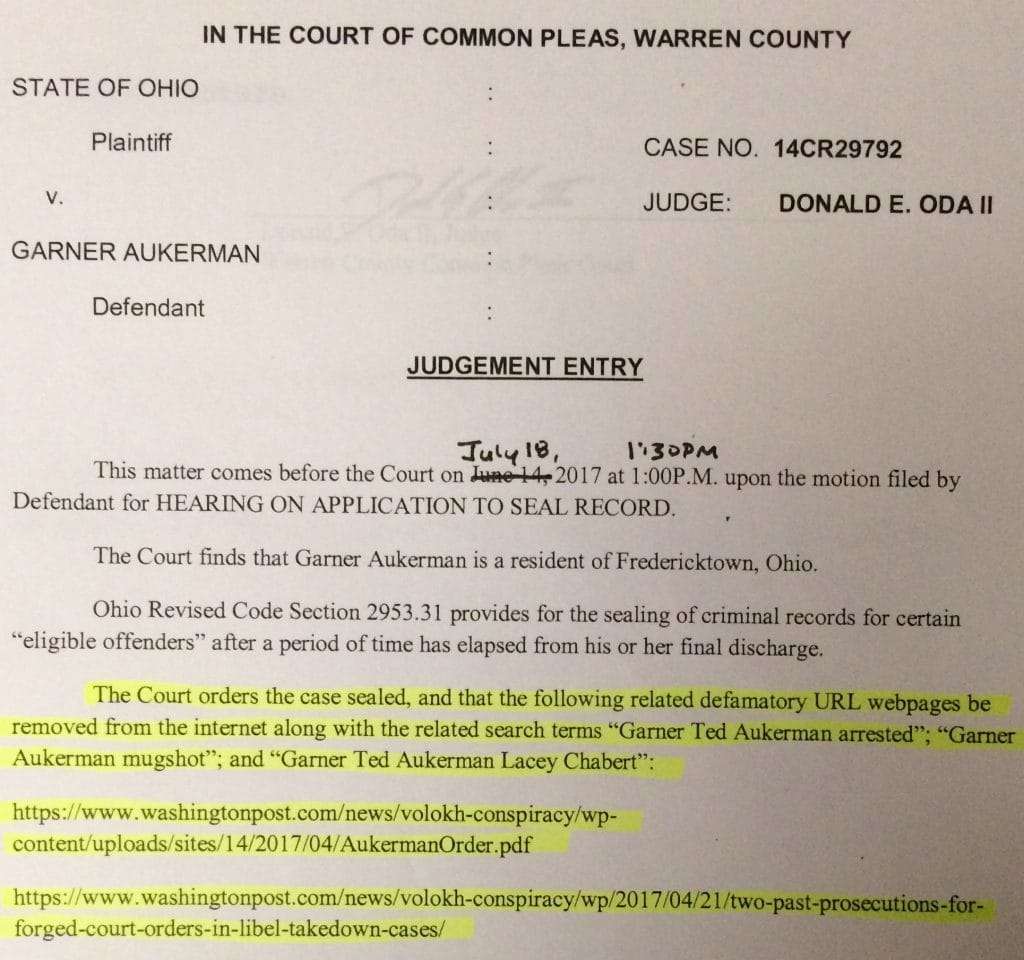The Volokh Conspiracy
Mostly law professors | Sometimes contrarian | Often libertarian | Always independent
What seems like a court's 'judgement entry' ordering removal of my Post item about a previous forged court order
As I've mentioned before, Google will sometimes deindex material - essentially hide it from online searches - when it sees a court order that finds the material to be defamatory. This leads some people to submit forged court orders instead of real ones (and engage in other similar shenanigans). In April, I mentioned two prosecutions for such forgeries, including a prosecution of one Garner Ted Aukerman, who was convicted of contempt of court based on a judge's finding that he was responsible for "a fraudulent court order [that] has never been entered by [the] court":
Apparently Mr. Aukerman has taken [an] order setting the matter for hearing and deleted the middle section of that order in which he generated [in context, I think this means "inserted" -EV] the detail concerning the court's findings and orders. A hearing was never held, those findings were never made and the order is completely fraudulent.
Then, Monday, I saw that someone had submitted a takedown request to Google, asking that it remove (among other things) my April post, a copy of the forged court order, and a court order from a different Ohio court that declared Aukerman to be a vexatious litigant and thus requiring him to get leave of court before filing lawsuits. The takedown request was accompanied by:
- A notice of the hearing on Aukerman's request to seal his original Ohio criminal case (which was just focused on extraditing him for prosecution in Florida).
- The cover of an envelope apparently sent by the court to Aukerman, together with the judge's signature.
- The first page of an order sealing the criminal case.
- A page bearing (among other things) the caption of the case, the title "JUDGEMENT ENTRY," the statement, "The Court orders the case sealed, and that the following related defamatory URL webpages be removed from the internet," and a list of pages that includes my earlier post and the other items I mentioned above.
- A page containing the judge's signature, seemingly the bottom part of an order.
Here's the top part of the "JUDGEMENT ENTRY" page:

Naturally, I was pretty suspicious and looked into this further. Since the case was sealed, I couldn't check online whether the order was authentic, and the clerk's office couldn't help me either. But eventually I e-mailed the judge's secretary, and promptly got back a response saying that "The order you inquired about … is not authentic," and that the judge "did not make any findings regarding any URL webpages that were alleged to be defamatory, nor did [he] order anything be removed from the internet."
That left the question of who sent the deindexing request to Google - the request was submitted under the name "Ted Aukerman," and Garner Ted Aukerman would have been the one who benefited if the pages were deindexed, but it's conceivable that it might have been submitted by someone else. I therefore e-mailed Aukerman for his comment, which would have given him the opportunity to say that this wasn't his doing.
Instead, Aukerman responded that "The case is sealed. And you only included a judgement entry proposal in your email." Yet nothing that I see in the submission to Google suggests that he was billing the "judgement entry" as just a "proposal" - instead, it looks to me like a claim that this is a real court entry, related to the sealing order that was submitted together with it.
Indeed, what's the point of submitting to Google a mere proposal, with no judicial imprimatur behind it? Google may sometimes deindex material based on court orders, but why would it care that a litigant had merely proposed something to a court? (And, I'll stress again, nothing in the material submitted to Google indicates that the "JUDGEMENT ENTRY" is merely a proposal.) But no need to take my word on it; see for yourselves the documents submitted to Google, which were then archived by Google in the Lumen Database repository.


Show Comments (1)